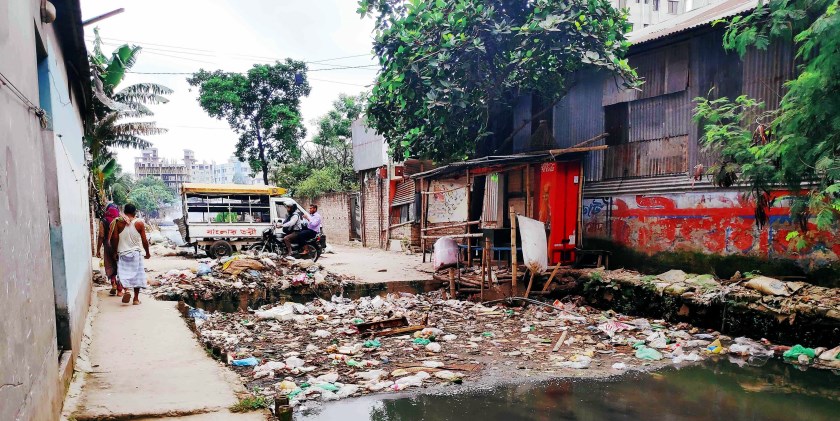Department Sanitation, Water and Solid Waste for Development
Towards Citywide Inclusive Sanitation

Citywide Inclusive Sanitation (CWIS) is an approach to urban sanitation, where all members of the city have equitable access to adequate and affordable improved sanitation services through appropriate systems of all scales (sewered & non-sewered), without any contamination to the environment along the entire sanitation value chain. Please find further information about CWIS in the open access special issue on Citywide Inclusive Sanitation from Frontiers in Environmental Science or in the article Solving urban sanitation – sustainably and equitably.
The video series “Towards Citywide Inclusive Sanitation” provides insights on how African and Asian cities are moving towards citywide inclusive sanitation. Sanitation experts give personal insights into their work, provide background information about the current sanitation situation in their cities, share their visions and highlight inspiring initiatives.
Kampala, Uganda
More about Kampala’s way towards CWIS
Readings:
- Leveraging FSM to Close the Urban Sanitation Loop in Kampala, A. G. Nkurunziza, Dr. N. L. Bateganya, J. Z. Byansi, J. Rokob, J. Busingye. in: FSM Innovation Case Studies, 2017. [pdf, 3.3 MB]
- SFD Report - Kampala, Uganda - SFD Promotion Initiative, Schoebitz, L., Niwagaba, C.B., Strande, L., 2016.
- Minimum Standards for Onsite Sanitation Technology Options in Kampala, KCCA, 2017.
Lusaka, Zambia
More about Lusaka’s way towards CWIS
Readings:
- The development and use of SFDs for better sanitation investment planning - A case story from Lusaka, GIZ, LWSC, LCC, 2019.
- The Heroes behind Sanitation - An insight into faecal sludge management workers in Zambia. Sperandeo, L., Srinivasan, S., 2020.
- Approaches to Faecal Sludge Management in Peri-Urban Areas: A Case Study in the City of Lusaka, Aubrey Simwambi, Sophia Hibler, Björn Pietruschka, Peter Hawkins, in: FSM Innovation Case Studies, 2017 [pdf, 6.27MB]
Scoping Study: Faecal Sludge Treatment Plants in South-Asia and sub-Saharan Africa - Chazanga, Zambia (p.31), Marius Klinger, Amadou Gueye, Anjali Manandhar Sherpa, Linda Strande. 2019.
Kathmandu, Nepal
More about Kathmandu's way towards CWIS
Readings:
- ISO 24521:2016 - Activities relating to drinking water and wastewater services — Guidelines for the management of basic on-site domestic wastewater services
Scoping Study: Faecal Sludge Treatment Plants in South-Asia and sub-Saharan Africa – Lubhu, Nepal (p.26), Marius Klinger, Amadou Gueye, Anjali Manandhar Sherpa, Linda Strande. 2019.
- ENPHO - Journal
Dhaka, Bangladesh
More about Dhaka’s way towards CWIS
Readings:
SFD Report - Dhaka, Bangladesh - SFD Promotion Initiative, Furlong, C., 2016.
SFD Report - Sakhipur, Bangladesh - SFD Promotion Initiative, Al-Muyeed, A., Nath, S. K., Basar, Md. S., 2018.
Tackling the Second-Generation Sanitation Challenge at Scale: Business Solutions for Inclusive Faecal Sludge Management in Bangladesh, Noémie de La Brosse, Rosie Renouf, Suman Kanti Nath. in: FSM Innovation Case Studies, 2017. [pdf, 4.3 MB]
Abidjan, Ivory Coast
More about Abidjan's way towards CWIS
Readings:
Barriers to access improved water and sanitation in poor peri-urban settlements of Abidjan, Côte d’Ivoire, Angoua ELE, Dongo K, Templeton MR,Zinsstag J, Bonfoh B, 2018. [pdf, 1.1MB]
SFD- Abidjan (in progress)
Sandec’s initiatives related to CWIS
- The ConCaD initiative is building capacity in private sector consulting firms and with individual consultants to conceptualize, plan, design and supervise the implementation of city-wide inclusive urban sanitation services.
- In the CWIS-project, our PhD candidate Abishek Narayan is developing a methodology for urban sanitation planning relevant for cities in low- and middle income countries. The project takes place in India.
Please visit the website of the group MEWS: Management of Excreta, Wastewater, and Sludge to learn more about their research and publications (e.g., Faecal Sludge Management book).
